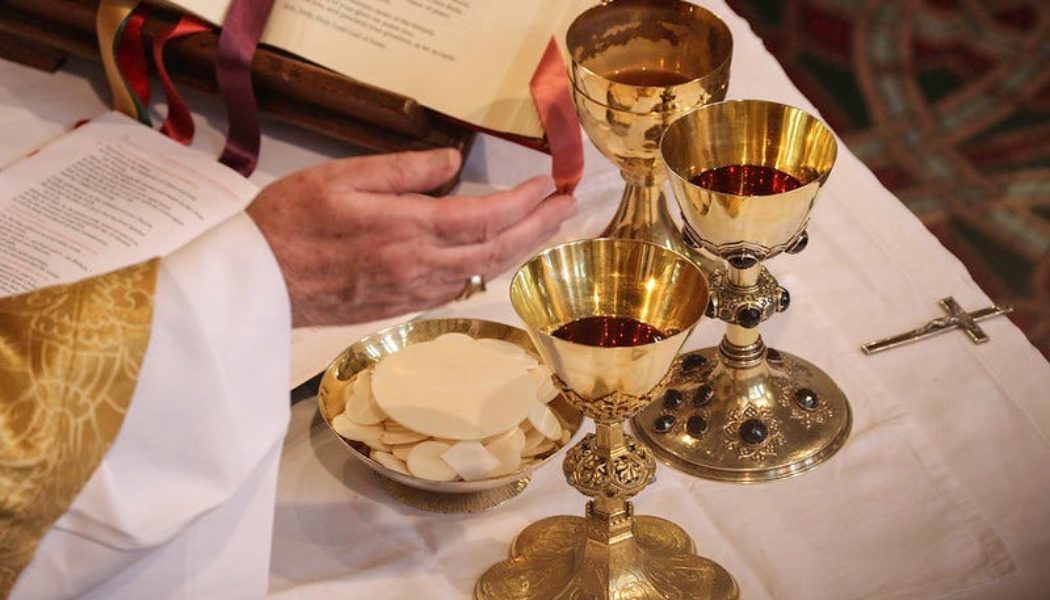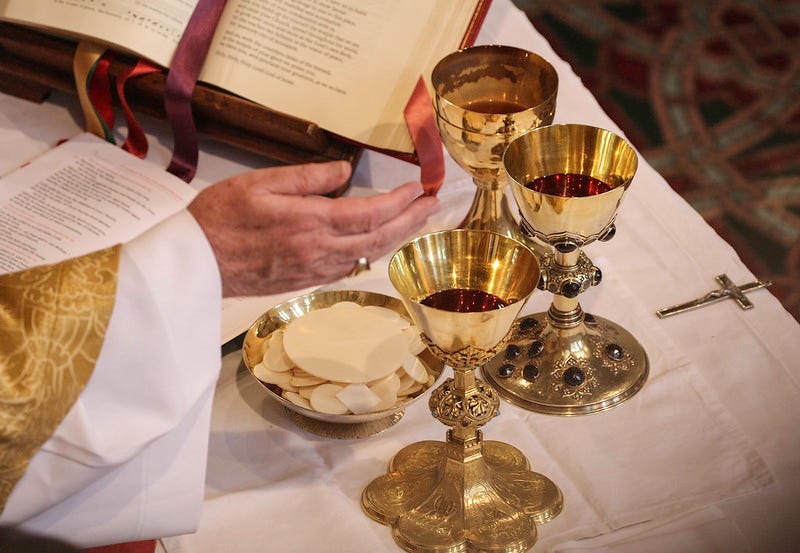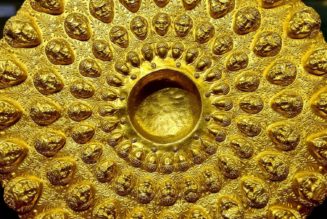May is National Celiac Disease Awareness Month, which recognizes an autoimmune disease that renders a person highly intolerant to gluten. According to some experts, the disease affects 1% of the global population, and is on the rise.
For Catholics, the celiac condition comes with a serious sacramental complication — how do you receive the Eucharistic species if you’re allergic to bread?
As the number celiac diagnoses rises, there has been increased use in some parishes of so-called “gluten free” hosts — but are they really “gluten free?”
Can you actually have a totally gluten free host — and would that still be valid matter for the Mass?
The Pillar explains.
—
How often are Catholics actually required to receive Communion?
Most Catholics know they are bound to what the Church calls the “Sunday precept,” requiring them to attend Mass on all Sundays and Holy Days of obligation, once they have made their first Communion — usually at the age of seven.
But that doesn’t mean they have to be receiving Communion once a week.
While canon law provides that “on Sundays and other holy days of obligation, the faithful are obliged to participate in the Mass,” “participation” in the Mass is actually distinct from the reception of Communion — indeed for many generations it was normal, even expected that most of the congregation would not be receiving the Eucharist at Sunday Mass.
Canon law provides a separate obligation that Catholics receive Communion at least once per year, during the Easter season, unless there is a serious reason why the Eucharist can only be received at another time of the year.
—
OK, and what is “valid matter” for the Eucharist?
The consecration of bread and wine into the body and blood of Jesus Christ in the Eucharist is the constituent part of the celebration of Mass.
For validity, the Church teaches that the Eucharistic sacrifice “must be offered with bread and with wine in which a little water must be mixed.”
The bread to be used, according to the Code of Canon Law, “must be only wheat, and recently made so that there is no danger of spoiling.”
While “according to the ancient tradition of the Latin Church, the priest is to use unleavened bread in the Eucharistic celebration,” that is not a requirement for validity, and in some Eastern Churches, leavened bread is actually the norm.
As celiac disease and other gluten intolerances have become more frequently diagnosed, Catholics afflicted by them have asked their parish pastors whether there is some they can be accommodated to receive the Eucharist.
But the problem for celiacs is that the process of making bread from “only wheat” necessarily involves gluten, which is a structural protein found in wheat — gluten gives the dough its elasticity.
So, can you ever actually have totally “gluten free” bread — even hosts — made from wheat only?
Well, no. That’s kind of like trying to make totally “alcohol-free” wine, which we’ll talk about in a minute.
The Dicastery for the Doctrine of the Faith, which has jurisdiction over defining the essential matter for the Mass, issued a circular letter to the world’s bishops in 2003 making the point explicitly: “Hosts that are completely gluten-free are invalid matter for the celebration of the Eucharist.”
No gluten, however, is very different from low gluten.
In most cases, even people with severe intolerance to gluten can receive Communion using a very, very low gluten host, which can be bought from some approved suppliers (the USCCB keeps a list). But even some of those suppliers have slightly unhelpful —and confusing — names like “GlutenFreeHosts.com Inc.”
And parishes actually need to be a little bit careful about that.
Some suppliers, catering to Protestant communities, actually offer completely gluten free hosts. But those are invalid for the Eucharistic celebration, since they simply don’t contain enough actual wheat to be considered “bread” in any meaningful sense of the word — at least as far as the Church is concerned.
Addressing those kinds of (invalid) alternatives, the Dicastery for Divine Worship — which has disciplinary authority over the celebration on Massc— wrote in the 2004 instruction Redemptionis Sacramentum that “bread made from another substance, even if it is grain, or if it is mixed with another substance different from wheat to such an extent that it would not commonly be considered wheat bread, does not constitute valid matter for confecting the Sacrifice and the Eucharistic Sacrament.”
As an aside, the DDW also added that “it is a grave abuse to introduce other substances, such as fruit or sugar or honey, into the bread for confecting the Eucharist.”
You wouldn’t think that the Vatican would have to remind people not to use raisin bread for Mass, but it’s a more common problem than you’d probably like to imagine.
—
But what if really low gluten is still too much?
While valid ultra-low gluten hosts are usually a practicable alternative for most people suffering from conditions like celiac disease, some people have such a violent allergy to gluten that any amount can be a medical problem.
So what are they supposed to do?
Most Catholics know that the Church has always taught that you can receive under a single species, and that to receive the host alone constitutes the full reception of the sacrament by a Catholic.
But does the reverse work, too? Can a Catholic receive Communion only via the chalice? Well, yes. In fact, the Church does not teach that the host is more the sacrament than the chalice, or that only one of the species but not the other can constitute full Communion.
The General Instruction of the Roman Missal states that sacred pastors “above all should instruct the Christian faithful that the Catholic faith teaches that Christ, whole and entire, and the true Sacrament, is received even under only one species [either one] and hence that as regards the resulting fruits, those who receive under only one species are not deprived of any grace that is necessary for salvation.”
While the Catechism of the Catholic Church affirms that the normal way in which Catholics receive under one kind is to receive only “under the species of bread,” it makes it clear that this is a pastoral norm, and not reflective of a doctrine.
As the USCCB states: “The lay faithful who are not able to receive Holy Communion at all under the species of bread, even of low-gluten hosts, may receive Holy Communion under the species of wine only, regardless of whether the Precious Blood is offered to the rest of the faithful present at a given celebration of Mass.”
While sourcing ultra-low gluten hosts or making sure ministers of Communion are adequately prepared to accommodate someone who can only receive via the chalice might be out of the normal experience for many in parish ministry, the conference also gives a reminder that the Code of Canon law provides that “any baptized person not prohibited by law can and must be admitted to Holy Communion.”
“It is important for pastors to make every effort to accommodate and normalize the experience of Communion for the faithful, including those suffering from celiac disease,” according to the USCCB.
In practice, a person who can’t receive a low-gluten host should simply not receive the host during Mass, and then get into line for the chalice. If the chalice is not ordinarily distributed at Masses, a simple visit with a pastor should usually suffice.
If he’s really unsure, just show him this explainer.
—
OK, but while we’re here, what if you can’t drink alcohol?
In the same way that some Catholics have real medical reasons for being unable to receive the sacrament under the sign of bread, because of gluten, others cannot receive from the chalice because they are unable to ingest even a small dose of alcohol — with severe alcoholism being the most common reason, but not the only.
So what is the valid matter for “wine” in Mass? Well, it “must be natural from the fruit of the vine and not spoiled,” according to canon law.
While you might be tempted to think wine is wine, and any bottle will do, it may not necessarily be the case.
Even if it says “wine” on the bottle, Archbishop Joseph Naumann warned, it could “contain additives such as elderberry extract, sugars, alcohol, etc” — all of which could render the wine invalid matter.
To avoid the possibility of invalidly offered Masses, the archbishop issued a decree mandating that “only those wines commercially produced specifically for use at Mass may hereafter be used in the celebration of the Most Holy Eucharist” in the archdiocese.
Many dioceses keep registers of reputable producers whose wine is made from grapes only, without added sugar or alcohol or other agents, and O-Neh-Da Vineyard, one of the country’s largest producers of pure grape wine, was actually launched in 1872 directly by Bishop Bernard McQuaid, who wanted a reliable source for altar wine.
Many American Catholics might be familiar with the practice in some Protestant communities of using grape juice or “alcohol free” wine — whatever that is supposed to be — but those are absolutely invalid for Mass.
The Dicastery for Divine Worship’s instruction states that “It is altogether forbidden to use wine of doubtful authenticity or provenance, for the Church requires certainty regarding the conditions necessary for the validity of the sacraments. Nor are other drinks of any kind to be admitted for any reason, as they do not constitute valid matter.”
The General Instruction of the Roman Missal requires that “The wine for the celebration of the Eucharist must be from the fruit of the vine, natural, and unadulterated, that is, without admixture of extraneous substances.”
Apart from the possibility that external substances like sugar, coloring, and flavoring may have been introduced, juice is invalid matter for the celebration of Mass because it has not undergone the process of fermentation — that’s what makes wine “wine,” and it necessarily creates alcohol, in the same way that making real “bread” from wheat involves some amount of gluten.
But hope is not lost for those who can’t consume alcohol. In some circumstances the Church approves the use of mustum, which is grape juice in which fermentation has begun, but has been suspended, with the result that its alcohol content remains essentially negligible but still present, in the same way that extremely low gluten hosts can be validly consecrated, but entirely gluten free hosts cannot.
The DDF’s 2003 letter explained that the local diocesan bishop is competent to grant permission for the celebration of Mass using mustum, but noted that it is intended only for situations where the priest celebrating the Mass could not otherwise consume the consecrated chalice because of serious “alcohol intolerance” including alcoholism.
The CDF letter, addressed to U.S. bishops, noted that “when the principal celebrant at a concelebration has permission to use mustum, a chalice of normal wine is to be prepared” for others to receive, especially any concelebrating priests.
The ordinary expectation is that those lay Catholics who cannot receive from the chalice normally would receive under only one kind, but in some cases — like in state prison systems where it is forbidden to bring even the tiny amount of wine necessary to celebrate Mass — mustum might be used for the congregation but only with permission.
And it seems possible that if a person has a medical condition which truly prevents them from receiving either trace amounts of gluten or normal amounts alcohol, the diocesan bishop would be competent to permit them to receive from a chalice in which mustum is consecrated.
—
The really important thing to remember is that according to canon law “It is absolutely forbidden, even in extreme urgent necessity, to consecrate one matter without the other or even both outside the Eucharistic celebration.”
So even if everyone in the assembly is receiving under only one kind, the priest has to consecrate both, and to receive both.
Always.
Comments 30
Services Marketplace – Listings, Bookings & Reviews










